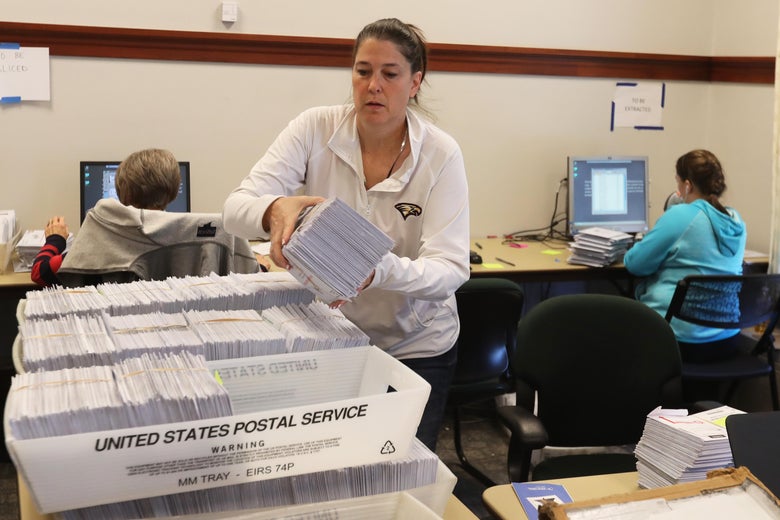

Slate's Who Counts? series is made possible by the support of Slate Plus members and readers like you.
The 26 th Amendment is often viewed as a relic of the Vietnam War era, when 18-year-olds protested the fact that they were old enough to be drafted but not to cast a ballot. Ratified in less than 100 days, the amendment enshrined in the Constitution citizens' right to vote at age 18, knocking down laws that set the voting age at 21. For decades, that guarantee was rarely invoked in court since lawmakers generally honored it. But as today's voting rights foes exploit a pandemic to disenfranchise Americans, the amendment has newfound importance: It should prevent states from discriminating against younger voters with both subtle and brazen tactics.
The threat of the coronavirus is creating unprecedented demand for absentee ballots; many Republican lawmakers are responding by trying to limit access. There are laws on the books to help them in one regard. Currently, seven states permit only elderly voters to mail in their ballots: Indiana, Louisiana, Mississippi, South Carolina, and Texas grant this privilege to voters 65 and older; Tennessee extends it to those 60 and older; and Kentucky only bestows it upon voters of "advance age." (None of these states have waived their age limit for the November election, though Indiana and Kentucky did so for their primaries.) Younger people who want to vote by mail must give a reason, such as a serious illness or absence from the state on Election Day. As New York magazine's Ed Kilgore has noted, these laws effectively limit absentee voting to "Trump-approved groups," older Americans who are much more likely to vote Republican.
On Wednesday, voting rights advocates filed a federal lawsuit against Texas' restriction. It is likely the first in a spate of challenges to protect the election. Unless the federal judiciary decides to unilaterally rewrite the 26 th Amendment, it will be obligated to invalidate these laws.
Although it is often viewed as a simple promise that Americans can vote upon turning 18, the 26 th Amendment is actually a broad ban on age-based voting restrictions. It declares that the right to vote "shall not be denied or abridged" for citizens 18 and over "on account of age." In other words, the amendment does not justprotect 18-year-olds' ability to vote. It also forbids any law that abridges adult citizens' right to vote because of their age. The amendment established a policy against laws that burden an adult's suffrage due to their youth, reflecting a national consensus that younger adults deserve fully equal access to the ballot. As Yael Bromberg detailed in her groundbreaking study of the 26 th Amendment, Congress said as much when considering the amendment in 1971: The Senate expressed its desire to remove "special burdens" on "young voters," while the House of Representatives sought to abolish any voting law that had "the purpose or effect of discriminating on account of age."
Initially, courts adopted this view of the amendment. For instance, when striking down a policy that disenfranchised students living on campus, the New Jersey Supreme Court wrote in 1972 that the amendment "clearly evidences the purpose not only of extending the voting right to young voters but also of encouraging their participation by the elimination of all unnecessary burdens and barriers." And the U.S. Supreme Court's only 26 th Amendment decision, , struck down a county policy that singled out college students for special scrutiny when they registered to vote, forcing them to reveal personal information that ostensibly helped the registrar determine whether they qualified. Other courts invalidated similar laws that made it more difficult for college students to vote, even when they did not fully disenfranchise them.
It is impossible to reconcile these decisions with contemporary laws that forbid adults of a certain age from voting by mail. In fact, it is remarkable that such laws remain on the books nearly a half-century after the ratification of the 26 th Amendment. Today, most litigation over the amendment involves overt efforts to suppress college students' suffrage-as when Florida attempted to outlaw early-voting sites on university campuses. (A federal judge blocked the rule as an unconstitutional age-based voting discrimination.) But the Constitution provides no lesser protection to voters age 18-64 who wish to vote absentee. As voting rights expert Joshua A. Douglas told me on Wednesday: "This is a strong claim. The 26 th Amendment not only forbids states from denying the right to vote on the basis of age over 18. It also prohibits them from 'abridging' the right to vote based on age. Yet the Texas law does exactly that: impose discriminatory voting rules on the basis of age."
If Americans cannot vote by mail in November, they will be forced to choose between protecting their health and exercising their constitutional rights. Some advocates are fighting in state court to expand absentee balloting, citing the health crisis and state-level voting protections. But they face a fierce battle in states like Texas, where lawmakers are appealing a state court order that would let voters cite the coronavirus as an excuse to vote by mail. Luckily, in seven states-including Texas-the 26 th Amendment plainly compels federal courts to strike the age limitation and open up vote by mail to everyone, young and old. Federal courts stacked with Donald Trump appointees may disagree given their flagrant disregard for precedent, but the Supreme Court should not let them write the amendment out of the Constitution. States simply have no power to impose "special burdens" on voters who are not in the demographic most favorable to Trump.
Slate is making its coronavirus coverage free for all readers. Subscribe to support our journalism. Start your free trial.